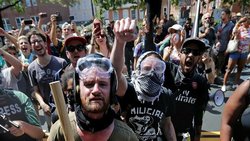 White supremacist violence is to blame for a spike in US domestic terror arrests, says Christopher Wray, the director of the Federal Bureau of Investigation.
White supremacist violence is to blame for a spike in US domestic terror arrests, says Christopher Wray, the director of the Federal Bureau of Investigation. RNA - Speaking at a Senate hearing, Wray said, “A majority of the domestic terrorism cases we've investigated are motivated by some version of what you might call white supremacist violence." However, he added, "it includes other things as well.”
According to Wray, the FBI has arrested nearly 100 people for being involved in terrorism-related acts domestically so far this year, a figure which is already higher than that of the entirety of the last year.
A report by the Centre for the Study of Hate & Extremism at California State University showed in March that there had been an increase in white supremacist attacks both in the US and around the world in recent years.
“White nationalism has reflected a coarsening of mainstream politics, where debates on national security and immigration have become rabbit holes for the exploitation of fear and bigotry,” according to the report.
“Our most recent police data, found a spike in many large US cities around election time 2018 as well,” Brian Levin, director of the centre, wrote in Time Magazine.
“We also found Ideologically motivated murders by white supremacists increased in 2018 to 17, from 13 in 2017,” he added.
A violent white supremacist rally in Charlottesville, Virginia in August 2017 turned bloody after a 20-year-old suspected Nazi sympathizer smashed his car into the counter-protesters, killing 32-year-old Heather Heyer and injuring some 20 others.
President Donald Trump, who has a strong following among white nationalists, called the far-right elements partaking in the demonstration as “very fine people.”
However, after pressure against him piled up, he declared that “racism is evil,” singling out white supremacists, neo-Nazis and Ku Klux Klan for the violent rally.
The Republican president was heavily criticized both in the country and abroad over his initial response to the violence in Charlottesville.
In the US, many lawmakers, including members of his own party as well as business executives distanced themselves from him. Also, officials in Britain, Germany, the UN and elsewhere denounced his remarks.
Critics say that Trump’s divisive rhetoric and policies against immigrants and minorities before and after his election have emboldened far-right groups and promoted hate crimes across the country.
847/940